Writing in the Real World
Cheryl Morgan is Salon Futura’s editor. She will be writing mainly about recent novel releases.
“What is this book about?” It is a common question in many literary discussions, and it can often lead to disputes. A critic might say, “this book is about the creeping industrialization of 20th Century Britain.” A reader might then respond, “Don’t be stupid, it is about a couple of Hobbits who go on a quest to destroy a ring and defeat a Dark Lord.” Both comments are right in their own way; different readers can read a book in very different ways, and authors cannot control how their books are read. There is no one correct way to read a book.
Even if an author doesn’t intend to put a “message” into a book, she still writes within a cultural context, and will be influenced by the concerns of the day. You can see this clearly in the history of science fiction. Back in the early days, the future often appeared to be all about the chrome-plated inevitability of the American Empire in space. As the decades rolled on, stories reflected the concerns of the Cold War, of the hippy era and the Vietnam War. The politics of cyberpunk reflected a growing concern about the rise of multi-national corporations, and today we see books that worry about climate change. The most common subtext in modern SF may be the 9/11 attacks, the subsequent wars in Iraq and Afghanistan, the security paranoia that followed in their wake. You can find these influences in the most unexpected places.
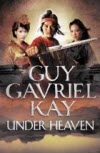 Take Under Heaven [Purchase] by Guy Gavriel Kay, for example. The book is set in a fantasy version of ancient China. Kay makes a point of not writing actual historical novels, because he dislikes writing about real people, but that doesn’t mean that his books don’t reflect what is happening in the real world now. The story of Under Heaven is a fairly simple one: a young man, Shen Tai, rises to political prominence at a time when the government of his country is weak. He owes his rapid advancement to an act of extreme piety that so impresses a foreign ruler that Shen Tai is given a gift of 250 horses. To us that may seem a lot of horses, but nothing earth shattering. However, in ancient China, cavalry were mounted on small steppe ponies. A herd of the much larger horses such as you might get from Persia would confer significant military advantage. Shen Tai has thus come into possession of a large collection of weapons of mass destruction, and this is enough to destabilize local politics.
Take Under Heaven [Purchase] by Guy Gavriel Kay, for example. The book is set in a fantasy version of ancient China. Kay makes a point of not writing actual historical novels, because he dislikes writing about real people, but that doesn’t mean that his books don’t reflect what is happening in the real world now. The story of Under Heaven is a fairly simple one: a young man, Shen Tai, rises to political prominence at a time when the government of his country is weak. He owes his rapid advancement to an act of extreme piety that so impresses a foreign ruler that Shen Tai is given a gift of 250 horses. To us that may seem a lot of horses, but nothing earth shattering. However, in ancient China, cavalry were mounted on small steppe ponies. A herd of the much larger horses such as you might get from Persia would confer significant military advantage. Shen Tai has thus come into possession of a large collection of weapons of mass destruction, and this is enough to destabilize local politics.
Another aspect of Kay’s book which is reminiscent of our world is that the aged Emperor has taken Wen Jiang, a beautiful young musician and dancer, as his favorite wife. He’s married a celebrity pop star. The girl’s ambitious brother, Wen Zhou, uses her popularity, and her influence with the Emperor, to help him become Prime Minister, but he quickly discovers that being in power is not just a matter of ordering people about, and having them killed if they disobey. Politics is hard, and you can’t always throw your weight around. As many of our real world politicians have discovered, no matter how powerful you are, if you lose the confidence of the people, you are in deep trouble.
Fantasy, of course, is often about the doings of kings and princes, so perhaps it is inevitable that it should touch on politics. But what about horror? How much politics are you going to find in a story about the zombie apocalypse?
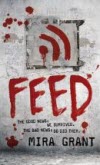 Quite a lot, as out turns out. FEED, by Mira Grant (the darker, grittier alter-ego of Seanan McGuire) [Purchase], is a near-future horror story set twenty years after the dead began to rise. It is serious science fiction as well as horror, as it contains a great deal of speculation about how the zombie plague might actually work, but it is also full of politics. After all, if there really were dead people wandering around town looking to eat the brains of the living, what would the reaction of the government be? Right: we’d get Security Theater to the max.
Quite a lot, as out turns out. FEED, by Mira Grant (the darker, grittier alter-ego of Seanan McGuire) [Purchase], is a near-future horror story set twenty years after the dead began to rise. It is serious science fiction as well as horror, as it contains a great deal of speculation about how the zombie plague might actually work, but it is also full of politics. After all, if there really were dead people wandering around town looking to eat the brains of the living, what would the reaction of the government be? Right: we’d get Security Theater to the max.
Fear makes people stupid, and Kellis-Amberlee [the zombie virus] has had people scared for the last twenty years. There comes a point when you need to get over the fear and get on with your life, and a lot of people don’t seem to be capable of that anymore. From blood tests to gated communities, we have embraced the cult of fear, and now we don’t seem to know how to put it back where it belongs.
It is arguable whether FEED is a deliberate political satire about the current security paranoia, or whether Grant simply had such issues in mind while she was writing the book, but it doesn’t really matter either way. Because she lives in a world where security paranoia is a common concern, she’s well aware of the pitfalls of such a situation and uses that in her plotting. In creating a world that is filled with the ever-present menace of the walking dead, Grant chooses to worry about how people prove that they are free from infection. If she had written a book in which anti-zombie security was highly effective and unobtrusive she would probably have been accused of deliberately ignoring the real problems of the security industry and being politically biased.
The political nature of Grant’s book is intensified because the lead characters are a trio of young bloggers who are given access to the campaign of an ambitious senator. This gives Grant plenty of opportunity to take pot shots, not just at the US political system, but at how elections are covered in the media. A book that is at heart just a political thriller with zombies instead of terrorists, and bloggers instead of Jack Bauer, has an opportunity to say so much more, if the readers want to hear such messages. And if they don’t, there are always plenty of zombies needing to be blown away.
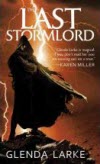 Glenda Larke is perhaps an even less likely candidate for writing political fiction than is Grant. Larke’s books are aimed squarely at that segment of the fantasy market read largely by women which contain significant elements from the romance genre. From that point of view, The Last Stormlord [Purchase] is one of the least adventurous, most formulaic books that Larke has written. It is spot on target for the intended market, and is doing very well, but scratch the surface and you quickly see political concerns shining through.
Glenda Larke is perhaps an even less likely candidate for writing political fiction than is Grant. Larke’s books are aimed squarely at that segment of the fantasy market read largely by women which contain significant elements from the romance genre. From that point of view, The Last Stormlord [Purchase] is one of the least adventurous, most formulaic books that Larke has written. It is spot on target for the intended market, and is doing very well, but scratch the surface and you quickly see political concerns shining through.
Although she now lives in Malaysia, Larke is Australian by birth and is well aware of the precarious nature of life in a country that is almost entirely desert. Also she has a keen interest in the environment. The Last Stormlord is a book about a culture whose advanced technology (sorry, “magic”) is capable of controlling the weather and bringing rain to a parched landscape. This technology is reliant on certain individuals whose genetic make-up allows them to exercise weather control powers. When the supply of appropriately skilled youngsters begins to dry up, the future of the culture is threatened.
The politics doesn’t stop there: possession of weather-controlling technology has brought significant wealth to the dominant culture. But there are barbarians at the gates, people who live hard lives in the desert and scorn the soft city dwellers. Furthermore, when water becomes short, the ruling classes have difficult choices to make about whether to ration supplies fairly and cause suffering all round, or to deliberately withdraw supplies from country areas to keep the city folks (including themselves) happy. The Last Stormlord is a book about a technologically advanced culture moving into an era of resource shortages. There are plenty of parallels there with our world.
As I said at the beginning, my point here is not to claim that these authors are deliberately writing fiction with a political message. They are simply intelligent, observant people whose writing is bound to be infused with topics and themes that interest and concern them. That happens even when writers are deliberately not writing about politics.
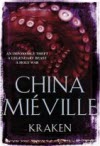 Take China Miéville’s Kraken [Purchase], for example. Miéville is well known for his left-wing political views, but he makes of a point of not belaboring his readers with polemic in his fiction. Kraken is probably the least overtly political book that he has written. It is a hugely entertaining romp about giant squid and all manner of odd religious cultists. And yet Miéville still writes about things that are familiar to him. When his fictional London is under threat from a tentacular apocalypse, he doesn’t focus on politics and the media the way Grant does, but instead looks at how ordinary people try to defend their communities.
Take China Miéville’s Kraken [Purchase], for example. Miéville is well known for his left-wing political views, but he makes of a point of not belaboring his readers with polemic in his fiction. Kraken is probably the least overtly political book that he has written. It is a hugely entertaining romp about giant squid and all manner of odd religious cultists. And yet Miéville still writes about things that are familiar to him. When his fictional London is under threat from a tentacular apocalypse, he doesn’t focus on politics and the media the way Grant does, but instead looks at how ordinary people try to defend their communities.
Kraken is a book that is shot full of lovely comedy moments: one of the best sources of laughs is the Union of Magical Assistants. Apparently inspired by The Sorcerer’s Apprentice, in which the lazy Mickey Mouse enchants mops and pails to do the cleaning for him, this is a union for anyone forced into slavery by enchantment. It is a lovely idea, but who, other than China Miéville, or perhaps Terry Pratchett, is likely to write a fantasy novel containing a comedy trade union for magically animated household objects?
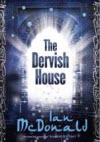 My final example is a book that is very clearly inspired by real world events, but may seem a little odd to many readers. Ian McDonald’s The Dervish House [Purchase] has many layers of inspiration, but one of them is the world market in energy. One of the main characters in the book is an ambitious commodity trader working for an Enron-like company. An element of the plot centers on the fears of the Turkish government that terrorists might try to blow up one of the tankers of liquefied natural gas that sail through the Bosphorus. However, for someone attuned to a world of security paranoia, the beginning of the book does not go as expected.
My final example is a book that is very clearly inspired by real world events, but may seem a little odd to many readers. Ian McDonald’s The Dervish House [Purchase] has many layers of inspiration, but one of them is the world market in energy. One of the main characters in the book is an ambitious commodity trader working for an Enron-like company. An element of the plot centers on the fears of the Turkish government that terrorists might try to blow up one of the tankers of liquefied natural gas that sail through the Bosphorus. However, for someone attuned to a world of security paranoia, the beginning of the book does not go as expected.
The story opens with a woman blowing herself up on a crowded commuter tram in Istanbul. No one else on the tram is seriously injured, and it eventually turns out that there is a reason for this. But what immediately struck me, having been in America at the time of the 9/11 attacks, was the lack of response from the Istanbul authorities and media. Where was the security clampdown? Where were the demands for action? Why was the tram service not suspended until citizens could be assured that travel was safe?
As the book progresses, McDonald explains that low level terrorist atrocities are fairly common in the Istanbul of his book. The people of the city, he says, have learned to take such things in their stride and not succumb to fear in the way that, for example, the inhabitants of Mira Grant’s future America have done. It was at this point that I remembered that McDonald lives in Belfast, a city where the adult population has lived through a time in which learning to take terrorist bombings in your stride and carry on with your life was a necessity.
We write about what we know. It is the way we are wired as human beings. It takes a serious effort to write a book that is entirely free of the concerns that surround us in our daily lives. To do so would be a conscious act of escapism, a deliberate decision to take people away from the real world, and into one where politics and the state of the world do not matter.
My colleague at Salon Futura, Sam Jordison, has been following both the Hugo Awards and the Booker Prize for The Guardian. He tells me that he is much more likely to find a book apparently addressing the issues of the day in the list of Hugo winners than in the list of Booker winners. This is a small sample, to be sure, but perhaps it points to something deeper about the nature of the books that get selected for the two awards.
Escapism, is something that science fiction and fantasy fiction is regularly accused of, mainly by people who write “literary” fiction. Quite what “literary” means in this context is unclear, but a common trait of such books is to focus on personal relationships. Literary novels are often character studies. Such books can, of course, embrace the political as well. Tolstoy’s War & Peace is famously set against the background of the Napoleonic Wars. But a book that is simply about the lives of a few ordinary people can fairly easily isolate itself from world affairs. When your novel requires you to undertake an exercise of world building, as science fiction and fantasy books frequently do, ignoring political issues can be much harder.
To say that speculative fiction may be less escapist than realist fiction is an odd reversal of the accepted wisdom, but entirely understandable. Just because books are not set in the real world, it doesn’t mean that they can’t address real world issues. In fact, because their authors have to think about how this world works in order to create a new one, they are much more likely to have to consider political issues in doing so. It is also the case that it can be much easier for an author to address sensitive political issues by writing about a very similar situation in an imaginary world.
Not all authors consciously think about political issues when they write, however, if they don’t do so, the worlds they create will still reflect their own cultural background and biases. The assumption of “normality” can often be a very political statement, especially to a reader who comes from a minority group that is deemed “not normal”.
An author can successfully avoid appearing political by setting her book in the real world, focusing tightly on human relationships rather than on world affairs. That is often what writers of literary fiction do, although some recognize that even personal relationships are a highly politicized product of specific cultures. But speculative fiction demands that the writer should do something different, should create a fictional world that is different from the one we know. And once you have started down that slippery slope, all sorts of things may follow.
Pingback: Cheryl's Mewsings » Blog Archive » The Dead Critics Panel
Cheryl,
I am really happy about Wizard’s Press and Salon Futura – if for nothing else, I get to read your incisive book critiques. You are one of my favorites (the other being Gary Wolfe in Locus). Hope this new venture rewards you with rich experiences and some financial gain as well.
Bob